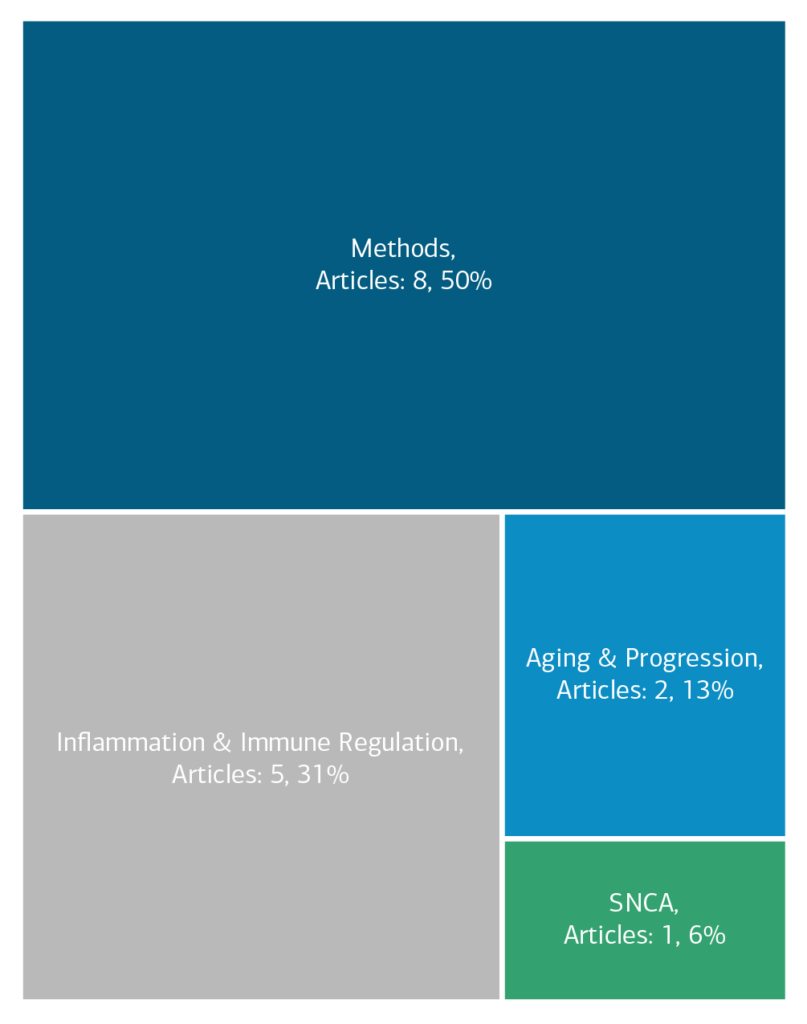NEURO-IMMUNE INTERACTIONS | 2020
From Cancer Associations to Altered Immunity in the Pathogenesis of Parkinson’s Disease
Study Rationale: Parkinson’s disease is characterized by premature death of dopamine-producing neurons in the brain; cancer is characterized by overgrowth of dividing cells. Despite being very different, Parkinson’s disease and cancer both have immune dysfunctions. Cancer occurs when the immune system fails to safeguard, and immune therapy holds new hope for cancer treatment. Parkinson’s disease has also been related to immune dysregulation. Moreover, Parkinson’s disease and cancer can in fact be caused by the same gene alterations. Two genes, LRRK2 and Parkin, are among such genes.
Hypothesis: Team Chen brings together a team of experts in the fields of Parkinson’s disease and cancer to borrow sophisticated approaches from cancer research to collaboratively test a hypothesis that immune dysregulation is the reason why alterations in LRRK2 and Parkin can cause both Parkinson’s disease and cancer, with a focus on Parkinson’s disease in this proposed work.
Study Design: Team Chen will use dopamine-producing neurons derived from Parkinson’s disease patient stem cells, mouse models with genetically modified LRRK2 and Parkin to modulate and characterize their immune signatures in both the periphery and the brain. In addition, the team will perform immune profiling in samples from patients with Parkinson’s disease or cancer.
Impact on Diagnosis/Treatment of Parkinson’s Disease: The proposed work approaches Parkinson’s disease from a unique angle. The findings will help better understand common molecular mechanisms underlying Parkinson’s disease and cancer. Immune-related molecules and pathways identified may become new therapeutic targets for Parkinson’s disease.
Leadership
Project Outcomes
The findings of the project will advance Team Chen's understanding of how immune dysregulation triggered by Parkinson’s and cancer-associated genes can lead to degeneration of dopaminergic neurons, and may open new avenues for prevention and therapies for Parkinson’s disease. View Team Outcomes.
Team Outputs
Click the following icons to learn more about the team’s outputs:
Overall Contributions
Here is an overview of how this team’s article findings have contributed to the PD field as of November 2023. There are two different categorizations of these contributions – one by impact to the PD community and a second by scientific theme.
Impact

Theme

Featured Output
Below is an example of a research output from the team that contributes to the ASAP mission of accelerating discoveries for PD.
LRRK2 G2019S mutation suppresses differentiation of Th9 and Treg cells via JAK/STAT3
A recent discovery suggests that a type of immune cell called T cells might also play a role in Parkinson’s disease, based on findings of these cells in the brains of deceased PD patients. Team Chen has shown that a PD-related mutation in LRRK2 plays a role in regulating T cell differentiation.
Team Accolades
- Network Spotlights: Armin Bayati
Other Team Activities
- Working Groups: Clinical & Immune – Xiqun Chen (Co-Chair)
In the News
- Aligning Science Across Parkinson’s awards $161 million in grants (Philanthropy News Digest, September 24, 2020)
- Red/yellow brain pigment linked to Parkinson’s disease: Study (Parkinson’s News Today, March 23, 2024)











